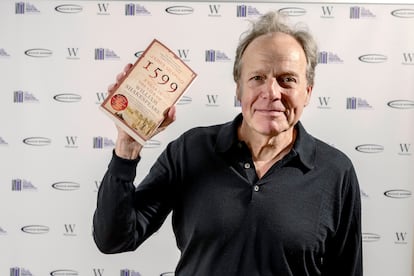Shakespeare tale scoops nonfiction ‘winner of winners’ prize
James Shapiro’s ‘1599: A Year in the Life of William Shakespeare’ was crowned from a field of six finalists drawn from the 24 winners of the Baillie Gifford award, which marks its 25th edition this year

An account of a pivotal year for English history and literature has been named the greatest-ever winner of the U.K.’s leading nonfiction book prize. James Shapiro’s 1599: A Year in the Life of William Shakespeare won the Bailli An engrossing account of “how Shakespeare became Shakespeare” has been named the greatest-ever winner of the U.K.’s leading nonfiction book prize.
James Shapiro’s 1599: A Year in the Life of William Shakespeare won the Baillie Gifford Prize Winner of Winners award on Thursday. It was crowned from a field of six finalists drawn from the 24 winners of the Baillie Gifford Prize, which marks its 25th edition this year.
Shapiro, professor of English and comparative literature at Columbia University, was awarded the 25,000-pound ($31,000) prize at a celebratory dinner in Edinburgh, Scotland.
Shapiro said it was “extraordinarily gratifying” that the book is still read and recommended, almost 20 years after it was first published.
“I hated Shakespeare in high school,” said Shapiro, now regarded as one of America’s leading Shakespearean scholars. “(I) wanted to write a book for people who, like me, didn’t necessarily get what this writer and his books were about.
“I think that’s one of the reasons why this book still has legs.”
The nonfiction award — launched in 1999 and known until 2015 as the Samuel Johnson Prize — celebrates English-language books from any country in the fields of current affairs, history, politics, science, sport, travel, biography, autobiography and the arts. It has been credited with bringing an eclectic slate of fact-based books to a wider audience.
Shapiro’s book, which won the prize in 2006, explores Shakespeare’s life in teeming Tudor London in the year he turned 35, completed Henry V, wrote Julius Caesar and As You Like It and produced the first draft of Hamlet, widely regarded as his greatest play.
“The book is really about how Shakespeare became Shakespeare,” Shapiro told The Associated Press.
The author has said that winning the original award in 2006 changed his life, by giving him the chance to work with theater troupes including the Royal Shakespeare Company, which in turn changed his understanding of Shakespeare.
“Actors care about Shakespeare probably more than anyone else does, and they love the book,” Shapiro said. “And that is always one of the great rewarding thigs for me.
“You’re talking to a very lucky writer whose book found him as much as he found the book.”
Author and academic Sarah Churchwell, one of the four prize judges, said Shapiro’s book “does so many things remarkably well.”
It’s “a biography of one of the greatest writers who ever lived, about whom we know almost nothing,” she said, and “a biography of the mind of a genius at work.”
Churchwell said the judges “felt it was important the book that won showed what creative nonfiction can do.”
1599 beat five other books, including British writer Craig Brown’s One Two Three Four: The Beatles in Time, Canadian author Wade Davis’ mountaineering odyssey Into the Silence and Canadian Margaret MacMillan’s history of the post-World War I peace talks, Paris 1919.
The two other finalists were American: Barbara Demick, for Nothing to Envy: Real Lives in North Korea, and Patrick Radden Keefe for opioid expose Empire of Pain: The Secret History of the Sackler Dynasty.
Sign up for our weekly newsletter to get more English-language news coverage from EL PAÍS USA Edition
Tu suscripción se está usando en otro dispositivo
¿Quieres añadir otro usuario a tu suscripción?
Si continúas leyendo en este dispositivo, no se podrá leer en el otro.
FlechaTu suscripción se está usando en otro dispositivo y solo puedes acceder a EL PAÍS desde un dispositivo a la vez.
Si quieres compartir tu cuenta, cambia tu suscripción a la modalidad Premium, así podrás añadir otro usuario. Cada uno accederá con su propia cuenta de email, lo que os permitirá personalizar vuestra experiencia en EL PAÍS.
¿Tienes una suscripción de empresa? Accede aquí para contratar más cuentas.
En el caso de no saber quién está usando tu cuenta, te recomendamos cambiar tu contraseña aquí.
Si decides continuar compartiendo tu cuenta, este mensaje se mostrará en tu dispositivo y en el de la otra persona que está usando tu cuenta de forma indefinida, afectando a tu experiencia de lectura. Puedes consultar aquí los términos y condiciones de la suscripción digital.








































